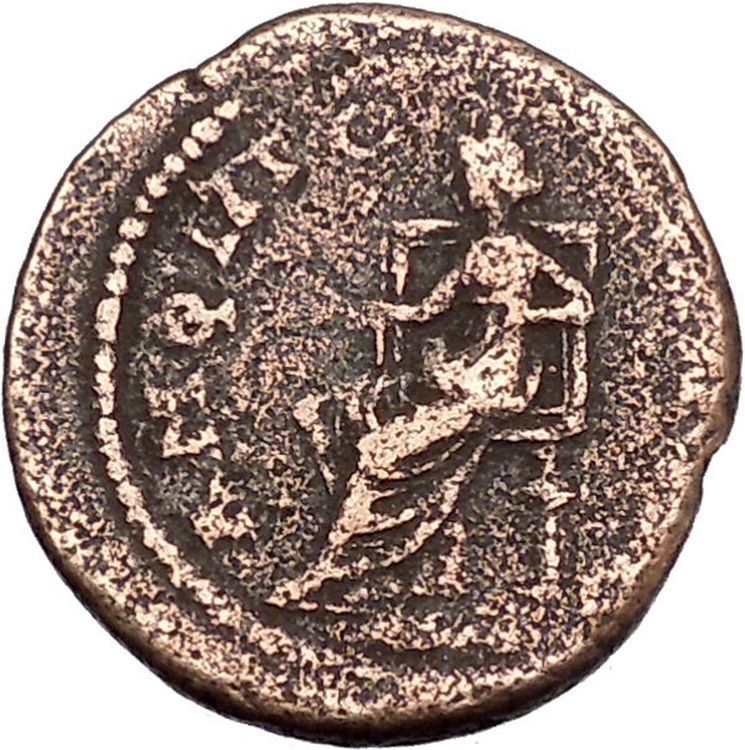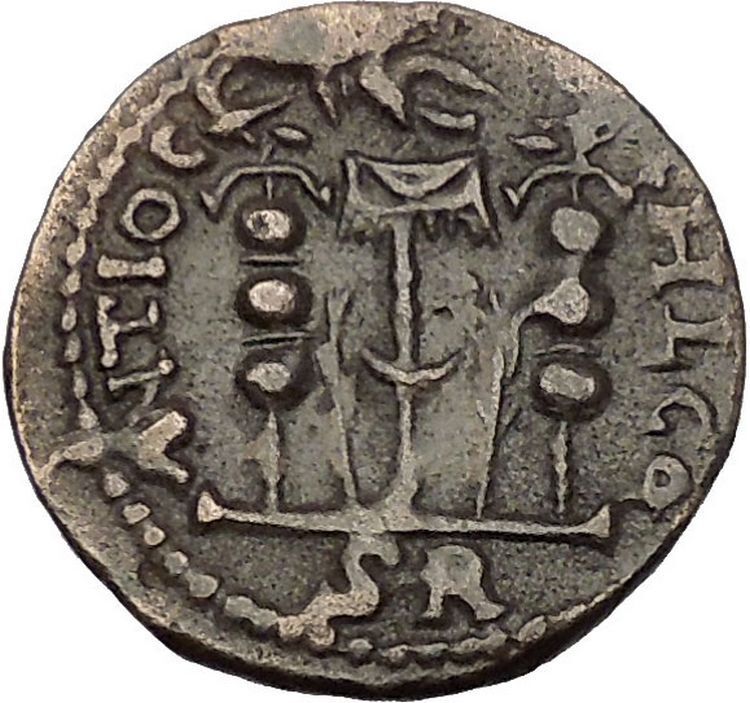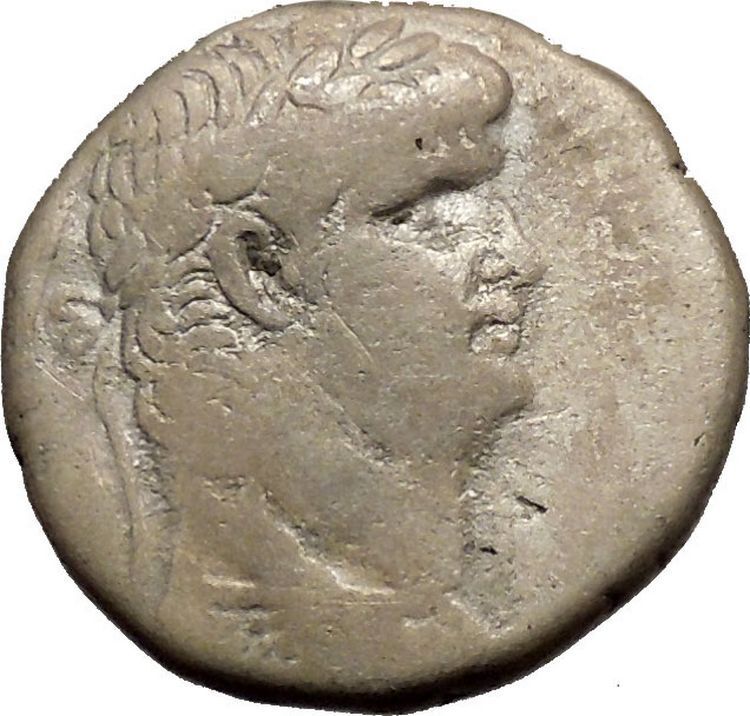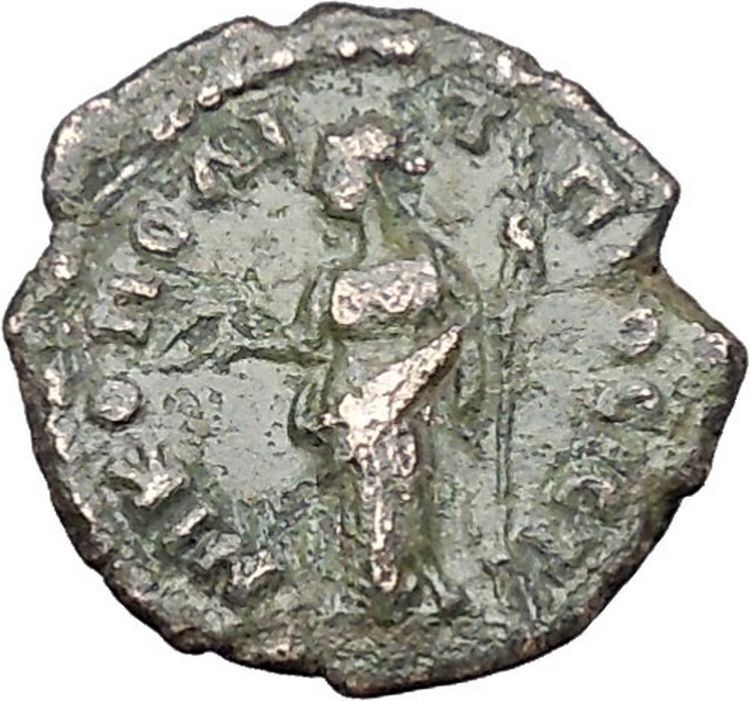|
Geta – Caesar: 198-209 A.D. and Roman Emperor: 209-211 A.D.
Bronze 26mm (9.66 grams) of Amorium in Phrygia
Reference: BMC 53.
Π CЄΠ ΓЄTAC KAICAP, Bareheaded, draped and cuirassed bust right.
AMOPIANΩN, Zeus seated left on throne, holding thunderbolt and scepter.
You are bidding on the exact item pictured, provided with a Certificate of Authenticity and Lifetime Guarantee of Authenticity.
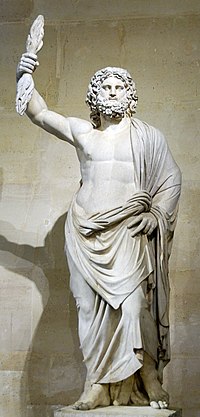 In the ancient Greek religion, Zeus was the “Father of Gods and men” who ruled the Olympians of Mount Olympus as a father ruled the family. He was the god of sky and thunder in Greek mythology. His Roman counterpart is Jupiter and Etruscan counterpart is Tinia. In the ancient Greek religion, Zeus was the “Father of Gods and men” who ruled the Olympians of Mount Olympus as a father ruled the family. He was the god of sky and thunder in Greek mythology. His Roman counterpart is Jupiter and Etruscan counterpart is Tinia.
Zeus was the child of Cronus and Rhea, and the youngest of his siblings. In most traditions he was married to Hera, although, at the oracle of Dodona, his consort was Dione: according to the Iliad, he is the father of Aphrodite by Dione. He is known for his erotic escapades. These resulted in many godly and heroic offspring, including Athena, Apollo and Artemis, Hermes, Persephone (by Demeter), Dionysus, Perseus, Heracles, Helen of Troy, Minos, and the Muses (by Mnemosyne); by Hera, he is usually said to have fathered Ares, Hebe and Hephaestus.
As Walter Burkert points out in his book, Greek Religion, “Even the gods who are not his natural children address him as Father, and all the gods rise in his presence.” For the Greeks, he was the King of the Gods, who oversaw the universe. As Pausanias observed, “That Zeus is king in heaven is a saying common to all men”. In Hesiod’s Theogony Zeus assigns the various gods their roles. In the Homeric Hymns he is referred to as the chieftain of the gods.
His symbols are the thunderbolt, eagle, bull, and oak. In addition to his Indo-European inheritance, the classical “cloud-gatherer” also derives certain iconographic traits from the cultures of the Ancient Near East, such as the scepter. Zeus is frequently depicted by Greek artists in one of two poses: standing, striding forward, with a thunderbolt leveled in his raised right hand, or seated in majesty.

Geta – Roman Emperor: 209-211 A.D.
| Caesar: 198-209 A.D. (under Septimius Severus and Caracalla) | Augustus: 209-211 A.D. (209-211 with Septimius Severus and Caracalla) (211 A.D. with Caracalla) |
| Son of Septimius Severus and Julia Domna | Brother of Caracalla | Brother-in-law of Plautilla | Nephew of Julia Maesa | Cousin of Julia Soaemias and Julia Mamaea |
Publius Septimius Geta (March 7, 189-December 26, 211), was a Roman Emperor co-ruling with his father Septimius Severus and his older brother Caracalla from 209 to his death.
Geta was the younger son of Septimius Severus by his second wife Julia Domna. Geta was born in Rome, at a time when his father was only a provincial governor at the service of emperor Commodus.
Geta was always in a place secondary to his older brother Lucius, the heir known as Caracalla. Perhaps due to this, the relations between the two were difficult from their early years. Conflicts were constant and often required the mediation of their mother. To appease his youngest son, Septimius Severus gave Geta the title of Augustus in 209. During the campaign against the Britons of the early 3rd century, the imperial propaganda publicized a happy family that shared the responsibilities of rule. Caracalla was his father’s second in command, Julia Domna the trusted counsellor and Geta had administrative and bureaucratic duties. Truth was that the rivalry and antipathy between the brothers was far from being improved.
Joint Emperor
When Septimius Severus died in Eboracum in the beginning of 211, Caracalla and Geta were proclaimed joint emperors and returned to Rome.
Regardless, the shared throne was not a success: the brothers argued about every decision, from law to political appointments. Later sources speculate about the desire of the two of splitting the empire in two halves. By the end of the year, the situation was unbearable. Caracalla tried to murder Geta during the festival of Saturnalia without success. Later in December he arranged a meeting with his brother in his mother’s apartments, and had him murdered in her arms by centurions.
Following Geta’s assassination, Caracalla damned his memoryy and ordered his name to be removed from all inscriptions. The now sole emperor also took the opportunity to get rid of his political enemies, on the grounds of conspiracy with the deceased. Cassius Dio stated that around 20,000 persons of both sexes were killed and/or proscribed during this time.
|




 In the ancient Greek religion, Zeus was the “Father of Gods and men” who ruled the Olympians of Mount Olympus as a father ruled the family. He was the god of sky and thunder in Greek mythology. His Roman counterpart is Jupiter and Etruscan counterpart is Tinia.
In the ancient Greek religion, Zeus was the “Father of Gods and men” who ruled the Olympians of Mount Olympus as a father ruled the family. He was the god of sky and thunder in Greek mythology. His Roman counterpart is Jupiter and Etruscan counterpart is Tinia.


